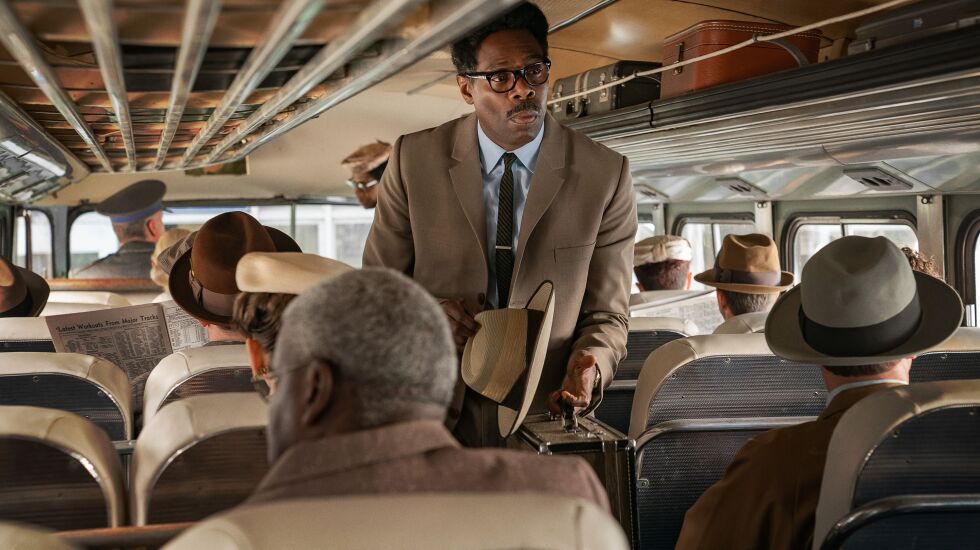
“On the day that I was born Black, I was also born homosexual. They either believe in freedom and justice for all, or they do not.” —Colman Domingo in “Rustin.”
George C. Wolfe’s 20th century historical film “Rustin” could have been subtitled, “Traditional Biopic of Worthy Subject Told in Straightforward, No-Nonsense Fashion,” for it is reminiscent of dozens if not hundreds of entries in this genre, at times resembling a solidly researched Wikipedia entry brought to life. More often than not, the dialogue turns into quotable speechifying and the overwrought score pounds the points home in decidedly unsubtle fashion, but thanks to the performances of an outstanding ensemble led by Colman Domingo’s electric and moving work in the title role, this is a valuable portrait of a man who hasn’t exactly been forgotten to history but is hardly a household name. (He should be.)
With screenwriters Julian Breece (“When They See Us”) and Dustin Lance Black (Academy Award winner for the screenplay of “Milk”) finding room for a myriad of real-life characters and a few fictitious players as well, “Rustin” has the trimmings of an epic film but appears to be working with a restricted budget, given the limitations of the crowd sequences. In fact, much of it could have worked as a stage play, as the majority of scenes take place in heated meetings, small apartments and humbly appointed organizational offices.
The film is set primarily in the early 1960s, with Domingo dominating the screen in every scene he’s in; his Bayard Rustin has the kind of presence that lights up the room and draws in an audience to hear what this man with the jarring gap in his upper front teeth has to say. (We eventually learn Rustin’s face was caved in when he refused to give up his seat at the front of a bus in Tennessee — this was a decade before Rosa Parks’ arrest — and was dragged off the bus and beaten by police.)
Rustin counts Martin Luther King Jr. (a solid if not particularly charismatic Aml Ameen) among his closest friends, but he has a number of staunch opponents within the Civil Rights Movement, including the forceful Rep. Adam Clayton Powell (the great Jeffrey Wright) and NAACP leader Roy Wilkins (Chris Rock, earnest but somewhat miscast). They bristle at Rustin’s displays of ego and are concerned that if word gets out about Rustin’s past Communist ties and, even more damning (in their eyes), his homosexuality, it will set back the movement 10 or 15 years. (When Powell spits out the phrase “King and his queen,” one gets the impression he can barely stand to be in the same room with Rustin.)
A number of other prominent figures, including A. Philip Randolph (a perfectly cast Glynn Turman), Medgar Evers (Rashad Demond Edwards) and Anna Arnold Hedgeman (the always wonderful CCH Pounder) have Rustin’s back, but he finds himself on the outside looking in for a couple of years — until 1963, when he’s essentially put in charge of organizing a greatly ambitious march on Washington that will entail tens if not hundreds of thousands of people demonstrating for jobs and freedom.
Much of “Rustin” consists of briskly edited and well-paced sequences of Rustin putting his incredible skills for organizing and delegating to use for the greatest mission of his life. He recruits hundreds of Black police officers from New York to act as volunteer, unarmed security. He assigns various volunteers to ensure there will be enough buses, a steady supply of drinking water, just the right type of sandwiches, etc., etc.
From time to time, Rustin’s personal life is brought to the forefront, as he becomes involved in a non-monogamous relationship with a younger white assistant (Gus Halper) and later with a married Black preacher (Johnny Ramey). After Strom Thurmond (a hateful voice heard on radio broadcasts) goes public with revelations about Rustin’s 1953 arrest in Pasadena for having consensual gay sex with two men in a parked car, Dr. King stands by him, and, in one of the most moving and powerful scenes in the film, Rustin’s staffers respond to the news simply by going back to work and concentrating on all the tasks necessary to bring about Rustin’s vision for a non-violent protest on a scale nobody had ever seen before.
The depiction of the actual March on Washington is relatively underwhelming, in part because we’ve seen archival footage, as well as dramatic interpretations, many times before, and in part because there clearly wasn’t the budget for an impressive number of extras or first-tier CGI. Still, as Rustin takes his place in history, standing just off to the side as King delivers one of the greatest speeches ever heard, it’s a fitting tribute to an important and tireless fighter for justice — for all.







